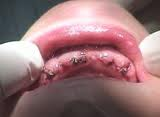What is an Immediate Denture?

An immediate denture is “a complete denture or removable partial denture issued immediately after an extractionâ€. Patient may have their teeth extracted due to caries, severe periodontal disease or for esthetic purpose. An impression is taken prior to the extraction, sent to the lab and constructed according to the patient’s cast of natural teeth. It has great advantages as the patient’s appearance is maintained with no edentulous period. Circumoral support, muscle tone, occlusion, jaw relationship, face shape and face height can be maintained. Speech and mastication is rarely affected and nutrition can be maintained sufficiently. Patient has a better social interaction with others.  As there is no try-in done beforehand, esthetics may not be satisfactory and patient may not feel comfortable with the resulting appearance and fit on the day the immediate denture is inserted. They are contraindicated in patients with poor general health, postirradiation of the head and neck regions, systemic conditions that affect healing or blood clotting. Uncooperative patients who fail to understand the demands and limitations of an immediate denture, fail to carry out proper oral hygiene measures will compromise the health of the remaining natural teeth and oral tissues.
Postoperative Care for an Immediate Denture
First 24 Hours
Keep your head up and have adequate rest to reduce blood pressure. Patient should avoid rinsing, drinking hot liquids or alcohol, and not remove the immediate denture during the first 24 hours. This will help to reduce the swelling and control bleeding from the fresh extraction site. Hot liquids cannot be felt and may cause burning of the oral tissues. Inflammation, swelling, bruising of the face and discoloration are likely to occur which can be managed by placing ice packs for about 20minutes on and off on the first day. Swelling predisposes to premature removal of the denture which makes its reinsertion impossible for the next 3-4 days or until reduction of the swelling. If reinsertion is satisfactory in the presence of swelling, the number of sore spots formed will be increased. Removal of the dentures will not help ease the pain experienced as a result of trauma from extraction. A dull ache may be present as the anesthetic effect wears off. Patients are prescribed with analgesics as required. Put less biting force on the dentures for the first few hours as you may accidentally bite your tongue and cheeks in midst of adapting to the new dentures.. Avoid incising food using the front teeth as it will cause tipping of the dentures and they come loose.
Patients are warned to expect minimal blood on their pillow during the first night, continuous bleeding is rare as the denture acts as a bandage in place. Patients are advised to eat soft foods like mashed potatoes, eggs, soups and go on a high caloric liquid diet like fruit juices, milk and loads of water. The next day, ask the patient where they feel sore and inform them that some discomfort is likely to occur on removing the immediate denture. A diluted mouthwash is prepared readily to allow the patient to rinse. The denture is then washed and the oral tissues are checked for sore areas. These are most common on the prominent bony areas where undercuts are present. Those areas are relieved in the acrylic resin. If denture retention is compromised, a tissue conditioner will aid in retention. Rinsing the mouth with warm salt water rinse is advised two to three times a day. Avoid smoking for the first 48 hours and keep your tongue away from extraction sockets and stitches until the healing is complete.
First Postoperative Week

Advice the patient to continue wearing the immediate denture at night for 7days consequently after the extraction or until the swelling reduces. Patient should be shown how to remove the denture after meals to clean it and to rinse the mouth at least three to four times daily to keep the extraction sites clean. The denture should be reinserted quickly. After one week, sutures are removed and patient can begin to stop wearing the denture at night. Vitamin C can be taken to help in the healing process.
Follow-up Care
Patients are reviewed on request or else weekly as required to check for sore spots. If retention is lost between visits, denture adhesives can be used. After 2weeks, the dentures are remounted on an articulator and refinement of the occlusion is done. Remember to brush lightly using soft-bristled toothbrush and soak your dentures in cleansing solution overnight. Do not use toothpaste as they contain abrasives and cause wearing away of the artificial tooth. Do not use hot water on your denture as they will warp.